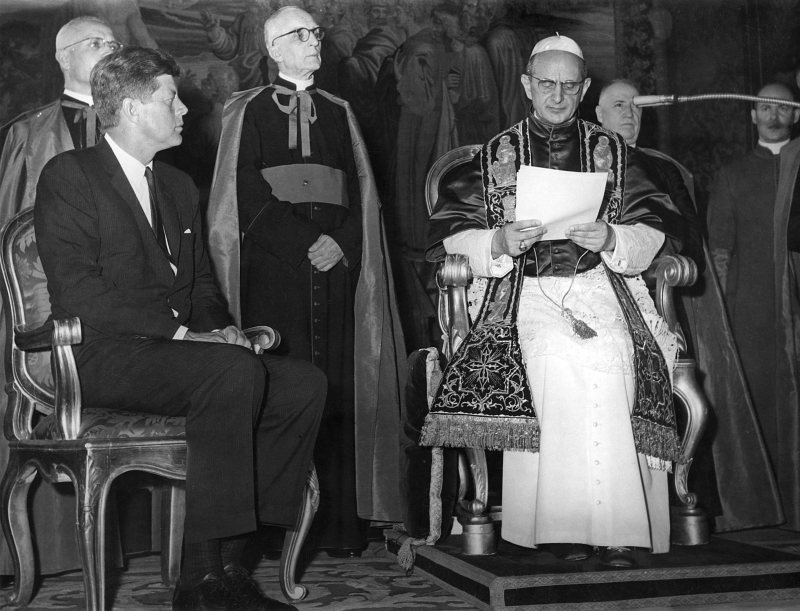On January 1, 1972, in his Message for the Celebration of the Day of Peace, Pope Paul VI declared to the world, “If you want peace, work for justice!” Since the beginning of the twentieth century, the world had suffered through two world wars, and numerous regional wars, resulting in carnage and suffering unprecedented in previous human history.
Given this sad history, it was not very difficult to comprehend the goal of peace. The means of achieving it, however, working for justice, was, and remains, another story.
Several questions arise.
What is justice? What is subsidiarity? What is solidarity? How do these ideas relate to human experience? On an individual basis, or a micro level, how can we identify which particular actions or modes of behavior are just and which are not? Further, on a broader, or a macro level, are there specific kinds of joint human activities, or social institutions and structures that are more likely to move societies toward justice, subsidiarity, and solidarity than others?
In my articles, I hope to answer some of these questions. I hope to outline briefly the meaning of justice (Commutative, Distributive, Legal, and Social), with respect to human action in general and economic relations in particular. Specifically, I hope to show that in structuring economic relations the best way to achieve justice is to promote competitive free market capitalism.
This may sound odd to some. It is true that some understand competition to be a catalyst resulting in great accomplishments by those working under its impetus. Others may be uncomfortable with a focus on competitive free market capitalism as a governing social principle. John Paul II, for example, in Centesimus Annus (1991), noted that, “It is a strict duty of justice and truth not to allow fundamental human needs to remain unsatisfied, and not to allow those burdened by such needs to perish.” (Paragraph 34) Those who are concerned about the potential adverse effects of competitive free market capitalism may ask how charity enters into the question.
In Caritas in Veritate, Pope Benedict XVI noted that, “Charity is at the heart of the Church’s social doctrine.” (Paragraph 2) In the same encyclical, he goes on to say that, “Charity goes beyond justice … but it never lacks justice. … Not only is justice not extraneous to charity, not only is it not an alternative or parallel path to charity: justice is inseparable from charity, and intrinsic to it. Justice is the primary way of charity, or, in Paul VI’s words, ‘the minimum measure’ of it, an integral part of the love ‘in deed and in truth’ … to which Saint John exhorts us.” (this is at Paragraph 6, citations omitted)
The question remains. Is it a violation of charity, and is it a contradiction of justice, to promote competitive free market capitalism as a means of achieving justice in economic relations? Many have sought to mitigate perceived ill effects of competition, and thereby achieve justice in the economy, by using the power of the state to correct market inefficiencies. I hope to show that while there is a role for the state to play in pursuing justice in economic relations, if that role becomes too extensive, justice may actually suffer.
Pope John Paul II was aware of this problem. In Centesimus Annus, again, he noted that, “The individual today is often suffocated between two poles represented by the State and the marketplace. At times it seems as though he exists only as a producer and consumer of goods, or as an object of State administration. People lose sight of the fact that life in society has neither the market nor the State as its final purpose, since life itself has a unique value which the State and the market must serve. Man remains above all a being who seeks the truth and strives to live in that truth, deepening his understanding of it through a dialogue which involves past and future generations.” Paragraph 49, Citation omitted.
Some believe, with Thomas Hobbes, that competition ultimately yields a life that is, “Solitary, poore, nasty, brutish, and short.” I disagree. My thesis is that in economic relations, competitive free market capitalism tends to promote the goals of justice, that “‘minimum measure’ of charity.” “Justice is the primary way of charity or, in Paul VI’s words, “the minimum measure” of it.
I hope to show that not only is competitive free market capitalism an efficient tool for bringing about justice in economic relations, but that it is also quite consistent with Catholic Social Teaching. As stated in the Compendium of the Social Doctrine of the Church, at number 347, “A truly competitive market is an effective instrument for attaining important objectives of justice: moderating the excessive profits of individual businesses, responding to consumers’ demands, bringing about a more efficient use and conservation of resources, rewarding entrepreneurship and innovation, making information available so that it is really possible to compare and purchase products in an atmosphere of healthy competition.”
Put simply, I hope to show that, at least in terms of economics, if you want justice, subsidiarity, and solidarity, promote competitive free market capitalism.








